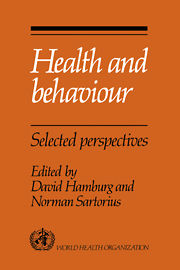Book contents
- Frontmatter
- Contents
- List of contributors
- Preface
- Acknowledgements
- List of abbreviations
- 1 Social and behavioural determinants of mental disorders
- 2 Food-related behaviour
- 3 The psychosocial environment and the development of competence in children
- 4 Children in danger
- 5 Adolescent health care and disease prevention in the Americas
- 6 Social networks and mental disorder (with special reference to the elderly)
- 7 Mental health aspects of general health care
- 8 The sociology of health care in developing countries
- 9 Population movements and health: global research needs
- 10 Health and behaviour: a worldwide perspective
- Index
1 - Social and behavioural determinants of mental disorders
Published online by Cambridge University Press: 06 August 2010
- Frontmatter
- Contents
- List of contributors
- Preface
- Acknowledgements
- List of abbreviations
- 1 Social and behavioural determinants of mental disorders
- 2 Food-related behaviour
- 3 The psychosocial environment and the development of competence in children
- 4 Children in danger
- 5 Adolescent health care and disease prevention in the Americas
- 6 Social networks and mental disorder (with special reference to the elderly)
- 7 Mental health aspects of general health care
- 8 The sociology of health care in developing countries
- 9 Population movements and health: global research needs
- 10 Health and behaviour: a worldwide perspective
- Index
Summary
The broad scope and the seriousness of the burden of illness directly associated with behaviour have been recognized as a major problem of public health and health policy. Between behaviour and related illness there is a great diversity of associations, which can be differentiated according to three aspects: health-relevant behaviour, which, in the form of risk behaviour, influences the probability of falling physically ill (e.g overt patterns of health-damaging behaviour such as smoking, faulty nutrition, and insufficient sanitary practices); identification of illness with deviant behaviour; and, finally, behavioural patterns or disabilities that result from illness and thus constitute a burden in themselves.
A major category in the behaviour-relevant burden of illness is overt mental illness. There are about 100 million people in the world who suffer from depressive disorders, and 40 million from other psychotic disorders. Another sizeable category in the burden of behaviour-related illness includes minor mental disorders, substance abuse, and drinking problems.
In many cases, chronic physical ill health and mental disorder interact. Chronic physical illnesses and disabilities frequently have an impact on patients' mental health, thus increasing the utilization of, and burden upon, the primary groups of the social network. When combined with physical illness, mental disorder may entail neglect of necessary dietary regimes or the intake of prescribed medicines and thus lead to a further deterioration in the patient's health. Other examples of how behavioural patterns may increase the risk of mental and physical illness are substance abuse and chronic alcohol abuse.
Keywords
- Type
- Chapter
- Information
- Health and BehaviourSelected Perspectives, pp. 1 - 44Publisher: Cambridge University PressPrint publication year: 1989



